Clean water is not a luxury but a necessity.
Although the US has one of the safest drinking water systems in the world, pollutants such as heavy metals, pesticides, hormones and pharmaceuticals occasionally find their way into our drinking water supply.
According to the Centers for Disease control, there are an estimated 4-32 million cases of waterborne diseases in the US each year. The most frightening thing about this information is the fact that you might be completely unaware of these contaminants in your drinking water.
Hence, it is crucial that you use a water filtration system to safeguard your family against these potentially life-threatening contaminants. But how much does a water filtration system cost?
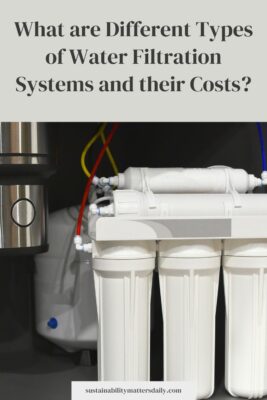
Table of Contents
- How much does a water filtration system cost?
- What are different types of water filtration systems and their costs?
- Factors Affecting the Average Cost of Water Filtration System
- Conclusion
How much does a water filtration system cost?
The average cost of setting up a water filtration system in your home is roughly around $1650, but it’s not quite as simple. There are a lot of different systems available, and the cost will vary depending on what you pick.
As this is an average price, your actual cost may vary depending on a variety of factors. While some people can get a system installed in as less as $750, some may have to shell out up to $2500.
|
Type of water filtration system |
Average cost |
Pros |
Cons |
|---|---|---|---|
|
Whole house |
$1000+ |
Capable of high volume |
Expensive |
|
Reverse osmosis |
$400 |
Very pure water |
Lots of water wasted |
|
Under sink reverse osmosis |
$200 |
Best value |
Requires installation |
|
Distiller |
$150 |
Very pure water |
Requires a lot of energy and time |
What are different types of water filtration systems and their costs?
The choice of a water filtration system depends on some factors including the contaminants you wish to remove.
Simple contaminants such as calcium or magnesium salts or sulfur can be eliminated quite easily.
On the other hand, if your tap water contains contaminants such as lead, pesticides or hormones, a more elaborate system is required.
The best way to decide which system you need is doing a water quality test. Several water analysis test kits are available in the market that allows you to find out the levels of specific contaminants in your water supply.
Most of these kits cost less than $50 and given the information they provide; it is a small price to pay.
Once you have analyzed your water supply, it is time to decide the filtration system that is best for your needs. But before we jump to it, let’s familiarize us with the types of water purifiers that are available on the market.
1. Distillation Units
Distillation is a process of evaporating the dirty, contaminated water and condensing the vapor in the separate place. As you can imagine, distillation is great if your water supply has a lot of dissolved solids in it.
As the process is carried out near the boiling point of water, most dissolved impurities can’t evaporate with the water.
Hence, after the vapor is condensed, you get mainly contamination-free and pure water. Distillation can remove bacteria and other pathogens, heavy metals and other dissolved solids.
The downside of this process is that this process also removes beneficial minerals from the water as well. Also, distilled water can taste quite flat due to the removal of oxygen during the process.
There are several types of distillers available for homeowners. Small, countertop versions are, well, small. They can distil and purify only a few gallons of water an hour, and you must refill the system at regular intervals.
Although there are some bigger models as well, they too require some form of manual input to operate.
As far as the cost goes, you can get a counter-top distillation unit for around $150.
However, as the capacity of the unit increases so does the cost. The cost of a large distiller can reach upwards of $1500.
Also interesting: Is bottled water distilled?
Pros
- Removes most dissolved impurities including bacteria and other pathogens
- Is available as a counter-top as well as floor unit
- Can cost significantly less compared to some other filtration units
Cons
- Distilled water can taste a bit flat
- Removes even the beneficial minerals from the water
- Is not very energy efficient process and needs some form of electric supply to work
- Requires some manual input to operate
Most Popular Brands on the Market
- Pure Water?
- Durastill?
- Efficient Water Purification: Power level: 750W; volume: 4L/1.1 gallon. This water distiller can distill 6 gal/22.7 L per day to eliminate dissolved solids, VOCs, and almost all other impurities, offering you the purest water. Ideal for distilling water, alcohol, and so on. Perfect for offices, homes, labs, dental clinics, etc.
- Easy to Use & Maintain: The distilled water machine can be started by simply pressing ON/OFF button, also with an automatic shutdown button inside. When the heating temperature exceeds 239℉/115℃, the distiller will automatically shut down to avoid excessive temperature damage to the machine.
- Health and Security: Full 304 stainless steel, including the internal tank, inner cap, water outlet, inlet, and all parts in contact with liquid, meet food hygiene standards. They are featuring in CE & FDA certificate, shock-proof container, and aluminum cooling fan.
- Fast Heat Dissipation: Unlike plastic fan blades, our countertop water distiller is changed to aluminum fan blades to improve heat dissipation. The exhaust cap is also changed from plastic to 304 stainless steel, improving the heat dissipation capability.
- User-friendly Details: The upgraded home water distiller machine has a unique portable handle on the top, easy to carry. The water container has a large opening and an ergonomic handle for easy access and cleaning. We also provide free carbon packs and fruit acid cleaners without your additional purchase.
2. Reverse Osmosis Systems
Reverse osmosis or RO for short is a very popular water purification technology. The RO systems can be quite sophisticated with multiple stages of water purification. Many systems even employ a UV decontamination step to destroy any surviving bacteria or other pathogens.
At its core, an RO system works on the principle of reverse osmosis, which you probably must have guessed!
In a, RO water purification system, water is passed through a series of ‘semi-permeable’ membranes.
These membranes have holes that allow only water to pass through along with some dissolved small ions such as sodium and calcium.
Large atoms such as heavy metals, hormones, pesticides and pharmaceutical compounds are left behind.
One of the biggest advantages of RO purification is the taste. As the RO water retains dissolved oxygen and minerals, it has a better taste compared to distilled water.
You can buy RO units in different sizes and capacities. While there are some counter-top systems on the market as well, most popular RO systems are usually faucet based systems.
The cost of these systems varies depending on the sophistication of the unit and the output. While some low-end units can be around $150-$200, some high-end units with multiple stages of purification or a UV treatment feature can easily cost upwards of $1000.
One thing to keep in mind while purchasing reverse osmosis systems is that most of the systems require professional installation unless you are buying a counter-top version.
The semipermeable membrane filters also need to be replaced at regular intervals to ensure proper functioning. Hence, you should think of these recurring costs as well. Although these expenses are not that high, they will be there nonetheless.
Pros
- Removes most pathogens, dissolved impurities such as pesticides, heavy metals, and even volatile impurities
- Available as both counter-top units as well as faucet based units
- Require little or no manual intervention to work
- Preserves the taste of water and keeps mineral content high
- Relatively energy efficient operation compared to distillation
Cons
- Require professional installation and regular maintenance
- Can cost more if you opt for multi-stage units with UV treatment
- Recurring costs can add up in the form of labor and replacement filters
Below is an example of an under-sink reverse osmosis system that requires installation:
- Supreme quality - designed, engineered and assembled in USA to guarantee water safety & your health.
- This 75 GPD 6-stage system ROES-PH75 is guaranteed to remove up to 99% of contaminants such as chlorine, taste, odor, VOCs, as well as toxic fluoride, arsenic, lead, nitrates, heavy metals and 1000+ contaminants. Max Total Dissolved Solids - 2000 ppm. Feed Water Pressure 40-85 psi
- US made cartridge uses food-grade calcium from trusted source for safe, proven water pH enhancement. Enjoy ultra-pure drinking water with added calcium minerals for improved ALKALINITY and great taste.
- WQA certified system. Premium long lasting filters used to treat tap/well water. Provide unlimited clean drinking water.
- America's No.1 rated water filter brand with 20 years of success guaranteeing trouble free, noise-free system for long lasting, dependable, pure drinking water.
Here is an example of a countertop reverse osmosis system, which will cost a bit more since they are self-contained systems:
- PUREST TASTING REVERSE OSMOSIS WATER: Zero Installation Purifier transforms ordinary tap water into clean, healthy and delicious drinking water. Choose AlcaPure Edition for Alkaline water, 7-8 pH, or OnliPure Edition for ZERO TDS water.
- MODERN AND STYLISH COUNTERTOP WATER FILTRATION SYSTEM: Beautify any kitchen with the best reverse osmosis system. Perfect for apartments, condos & RV’s.
- SPACE-SAVING DESIGN: The supply water tank is conveniently located in front of the unit, eliminating the need for top or side clearance. This allows the unit to be placed under most kitchen cabinets, saving you valuable kitchen space.
- BPA FREE. Removes up to 99% of all contaminants: Including Fluoride, Chlorine, Heavy Metals, Lead, PFOA, PFOS, & others.
- ZERO WATER WASTE: Easily accessible rejected water not suitable for drinking can be used for other purposes such as watering plants, washing produce, etc. With a 50% recovery rate, it’s the highest among ro water filter systems.
Finally, here is a whole house reverse osmosis system that will be the most expensive:
- Great for well water; for city water, consider model #HMF2SmgCC
- Massive filter housings with 1-inch ports for the strongest water pressure possible - up to 15-gallon per minute
- Multi gradient density replaceable sediment filter produces finer filtration and greater dirt holding capacity; filtration down to 1 micron
- Excellent purification removes up to 95% of iron, manganese, sediment, chemicals and other contaminants that create foul tastes and odors up to 3 PPM combined load
- Oversize filters improve flow rate and reduce maintenance frequency
Most Popular Brands on the Market
- GrowoniX?
- OmniFilter?
- Aquasana?
3. Whole house water filtration systems
Whole house water filters are more complex in functionality and scope as well. These systems are huge and can filter water on a continuous basis.
As a matter of fact, most of these systems are hooked right to the incoming water supply to your house.
These systems usually employ some different methods to get the water cleaned. Some of the methods used in these systems include the following.
- Ion-exchange resins
- Activated carbon filtration
- Filtration through a porous filtration media
As I said, the systems a quite big and as a result, you will need a professional installation. Although they are not that difficult to maintain, you will need professional help to keep them up and to run in top shape.
The biggest advantage of these systems, as you can imagine, is the convenience. Once the system is in place, you get pure, filtered water right from your faucets.
As the systems operate ‘in-line,’ there is no need to store the filtered water. Whenever you need purified drinking water, just turn on your faucet. It is as simple as that.
These units often come with additional features and some can even operate without electricity. As you can imagine, these units are the most expensive home water purification system. The average cost of this kind of water filtration system can range between $400 to upwards of $10,000.
Pros
- Can purify several gallons of water in no time
- As they are in-line systems, they can operate continuously
- No need to store filtered water
- Some systems don’t even require electricity to work
- Depending on the setup, can be as efficient as an RO system to purify water
Cons
- Significantly more expensive compared to the earlier two
- Need professional installation and maintenance
- You need to have regular maintenance and check-ups to keep it running smooth
Most Popular Brands on the Market
- Pelican?
- Aquasana?
- iSpring?
- Protect Your Family and Household Appliance from Sediment, Chlorine, and More: Say goodbye to smelly, bad tasting water! Our WGB32B whole house water filter system removes up to 99% of chlorine from water as well as up to 95% of sediment, rust, pesticides, herbicides, industrial solvents, VOCs, and various other contaminants. This whole house water filtration system is installed at the main water supply line to treat all the water in your home.
- DIY Installation and Maintenance: Refer to our manual and our helpful YouTube videos for easy DIY installation. With 1” NPT inlet / outlet and 20” x 4.5” filter cartridges, this whole house filter system has minimum impact on water flow (up to 15 GPM) and requires minimum maintenance.
- Top-Notch Quality: The 1st stage high capacity polypropylene sediment filter is able to achieve filtration down to 5 microns. The 2nd and 3rd stages carbon block filters are made of high quality coconut shell carbon for maximum efficiency and filter life. Both water filters are tested by an independent third-party to meet NSF/ANSI standards. This whole house water filter system has a capacity of 100K gallons of water, enough to supply a family of four with clean water for a full year.
- Peace of Mind Customer Service: Register online to activate your extended manufacturer warranty and life-time free tech support from U.S. local support team. We stand behind our products and if you encounter any problems with any of our products please reach out to us immediately. We are happy to help!
- Please Note: Unlike an RO system, this whole house water filtration system will NOT reduce Total Dissolved Solids (TDS), and instead keeps healthy minerals in your water. If you are interested in a filter that removes TDS, consider our iSpring Reverse Osmosis (RO) systems. The cartridges are individually wrapped to ensure freshness. Please unwrap the cartridges before use.
Factors Affecting the Average Cost of Water Filtration System
Some factors affect the cost of a water filtration system. Let’s take a look at them one by one.
The type of impurities in your water supply
The cost of a filtration system will vary greatly depending on the type of contaminants present in your water supply.
For instance, if your water supply is already quite clean, but you just need to get rid of the funky smell or taste, a small tap based system might be enough for you.
However, if your water supply contains some other impurities such as pesticides or heavy metals, you may require sophisticated filtration units such as Ro or distillation. These units cost a lot more than the simple tap filter.
Size of the System
As you can very well imagine, the more water you need to get filtered, the bigger unit you will need. And it goes without saying that larger units cost more.
Whether it is distillation unit, an RO unit or a whole house filtration system unit, big units cost more than small ones.
Running Costs
Maintainance and running costs can quickly add up.
For instance, if you go for an RO based system, you will need professional installation and maintenance which costs money.
Also, these systems require their membrane filters replaced after a certain amount of usage. Again, replacement filters cost money, and all this adds up to the expense of the unit itself.
Should you buy a single tap water filter unit?
Now, this is a bit more complicated question than you may think.
If your water supply is relatively clean and you only require filtered water for drinking and cooking then, yes, a single tap filtration system is a good option.
These systems are usually attached to a pipe that supplies water to a faucet. So, as the water passes through the system, it is filtered before it is dispensed through the faucet. Don’t get fooled by the small size of these units.
These can be quite complex and sophisticated as well. They can do a great job of removing a considerable amount of impurities from your tap water.
However, you will need some plumbing knowledge to install these systems. If you can, hiring a professional plumber is the best way to go.
As far as the cost of these systems goes, it varies greatly depending on the brand and the technology utilized in the unit.
Usually, these units cost somewhere between $50 to $100. However, as they do have a lifespan, they need to be replaced after some time.
Conclusion
As you can see, the question of how much does a water filtration system cost and the average cost of a water filtration system is not quite straightforward! It really depends on your specific filtration needs. If you are only concerned about your drinking water, you could even just use a simple pitcher filter and that would be it!
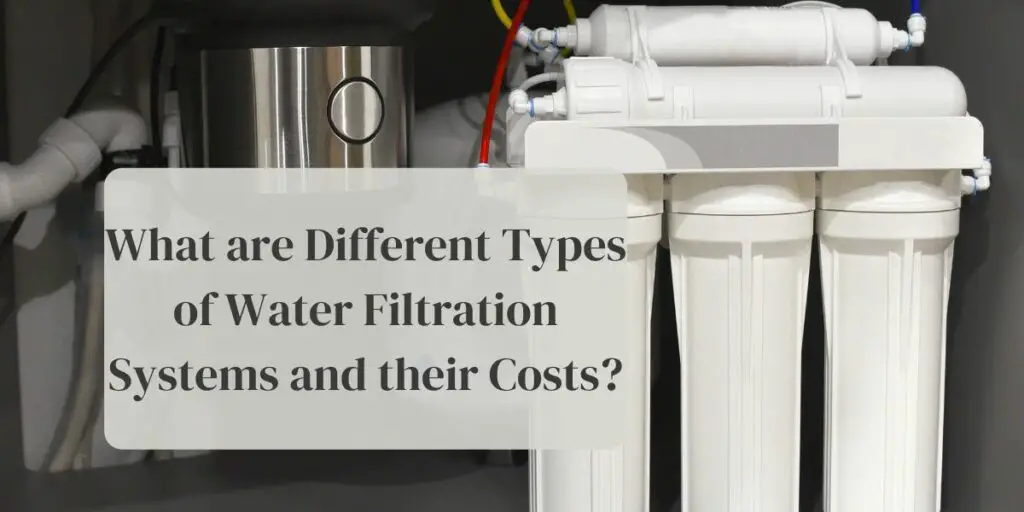

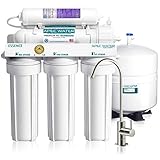



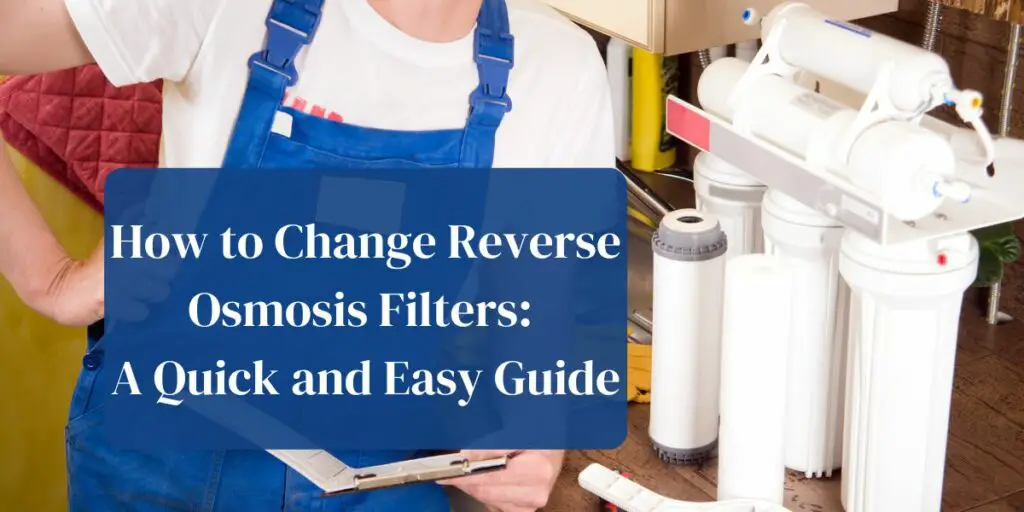
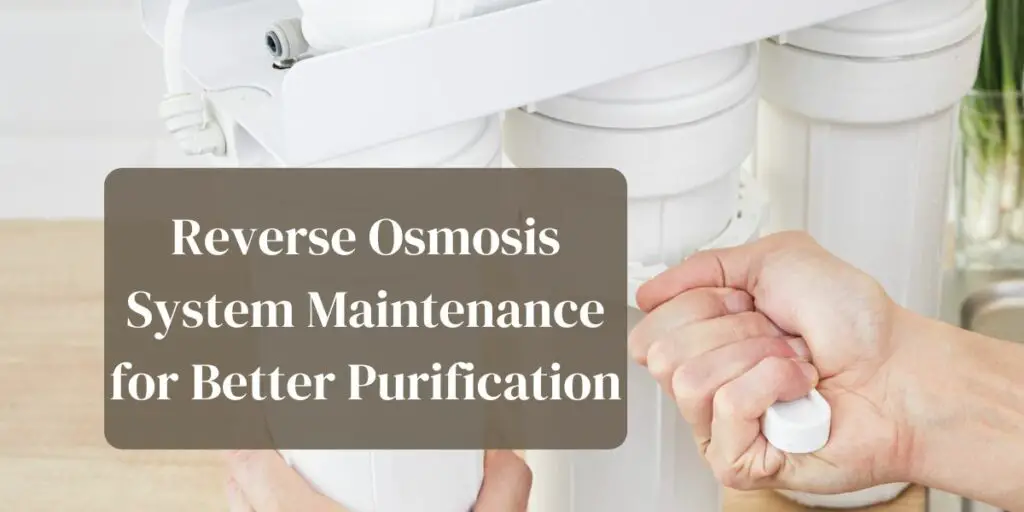
please quote me a water filtration/ purification system of 150-300 liters per hour
Very helpful information. Looking to store and filter city water.